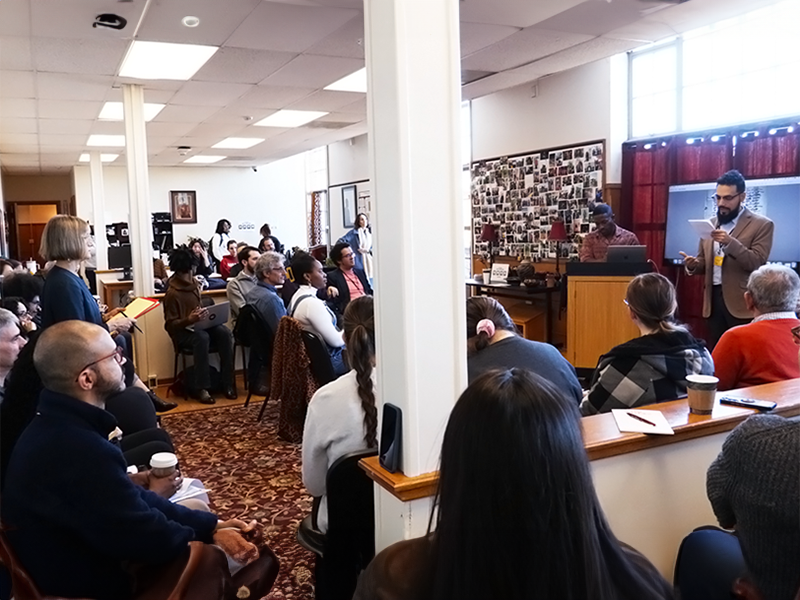
During Nov. 2-4, the U of A hosted an international symposium — Africa in Iberia: Memories, Genealogies and Geographies in Early Modernity — at which more than 30 scholars discussed how early modern Black Spaniards conceptualized Africa and Africanness in their archival footprint as well as in their cultural products and practices.
The research symposium was organized by Diana Berruezo-Sánchez of the Universitat Autónoma de Barcelona/University of Oxford, Cornesha Tweede of the Arizona State University and Manuel Olmedo Gobante of the U of A's Department of World Languages, Literatures and Cultures.
Africa in Iberia is the third meeting of The Making of Blackness Project, an international group of historians, anthropologists, ethnomusicologists and scholars in the fields of literary, visual and cultural studies who research on how Afro-descendants actively shaped narratives of Blackness in early modern Portugal and Spain. This gathering at the U of A was the first outside of Oxford, England.
Chancellor Charles F. Robinson welcomed the symposium participants at the Cordia Harrington Center for Excellence on Nov. 2. The chancellor's address was followed by a lecture by Noémie Ndiaye of the University of Chicago. Titled "On Things Forgotten," Ndiaye's address provided an enlightening state of the art that focused on the memories, genealogies and geographies of the field of early modern Hispanism and presented new research from her forthcoming book on the often neglected Afro-Romani connections in early modern drama.

Professor Nicholas R. Jones of Yale University gives a keynote address on “Antônio/Victória of Benin: Early Black Trans* Life in Sixteenth-Century Portugal” during the Africa in Iberia Symposium.
The second keynote speech was given by Nicholas R. Jones of Yale University at the African and African American Studies lounge at Memorial Hall on Nov. 3. Jones' address was titled "Antônio/Victória of Benin: Early Black Trans* Life in Sixteenth-Century Portugal," and centered upon the life of Victória/Antônio, a trans person from West Africa who was persecuted by the Portuguese Inquisition in Lisbon. Jones emphasized the importance of utilizing a non-Western, Afro-centered lens to analyze the ever-presence of queer folk since the dawn of time.
The symposium ended on Nov. 4 at the World Languages and Digital Humanities Studio with a conversation with Baltasar Fra-Molinero of Bates College, a leading scholar in the field of Afro-Hispanic literary studies. The conversation, titled "La imagen de los negros en el teatro del Siglo de Oro (1995): A Touchstone of Theater Studies at the age of 30," reflected on Fra-Molinero's academic career with an emphasis on his 1995 seminal book. The transcript of this conversation will be published in the prestigious scholarly journal Bulletin of the Comediantes, co-edited by Elizabeth Wright of the University of Georgia and Manuel Olmedo Gobante of the U of A.
The Africa in Iberia symposium showed the U of A's strong commitment to international research as well as to diversity, equity and inclusion. Participants limited their presentations to 15 minutes each, which allowed for ample dialogue across disciplines during the designated discussion sessions, meals and breaks. The symposium was described as "an invaluable opportunity to re-think the cultural history of the African Diaspora as well as the starting point of many collaborative research projects."
The symposium was sponsored by the Spanish Ministry of Science and Innovation (The Making of Blackness project, I+D+i PID2021-124893NA-I00, funded by MCIN/ AEI/10.13039/501100011033/). On-campus sponsors include the Department of World Languages, Literatures and Cultures; the Fulbright College of Arts and Sciences; the Arkansas Humanities Center; the History Department; the Anthropology Department; African & African American Studies program; the Medieval and Renaissance Studies program; the Middle East Studies program; the Division of Diversity, Equity and Inclusion; the Latin American and Latino Studies program; and the Comparative Literature & Cultural Studies program. It was made possible by the assistance of the World Languages and Digital Humanities studios and its team, including Director Curtis Maughan, Assistant Director Cheyenne Roy and studio researchers Larissa Rocha de Souza, Michael Hall and Isidoro Villa Ligero.
Topics
Contacts
Cheyenne Roy, assistant director
World Languages and Digital Humanities Studio
479-575-4159,